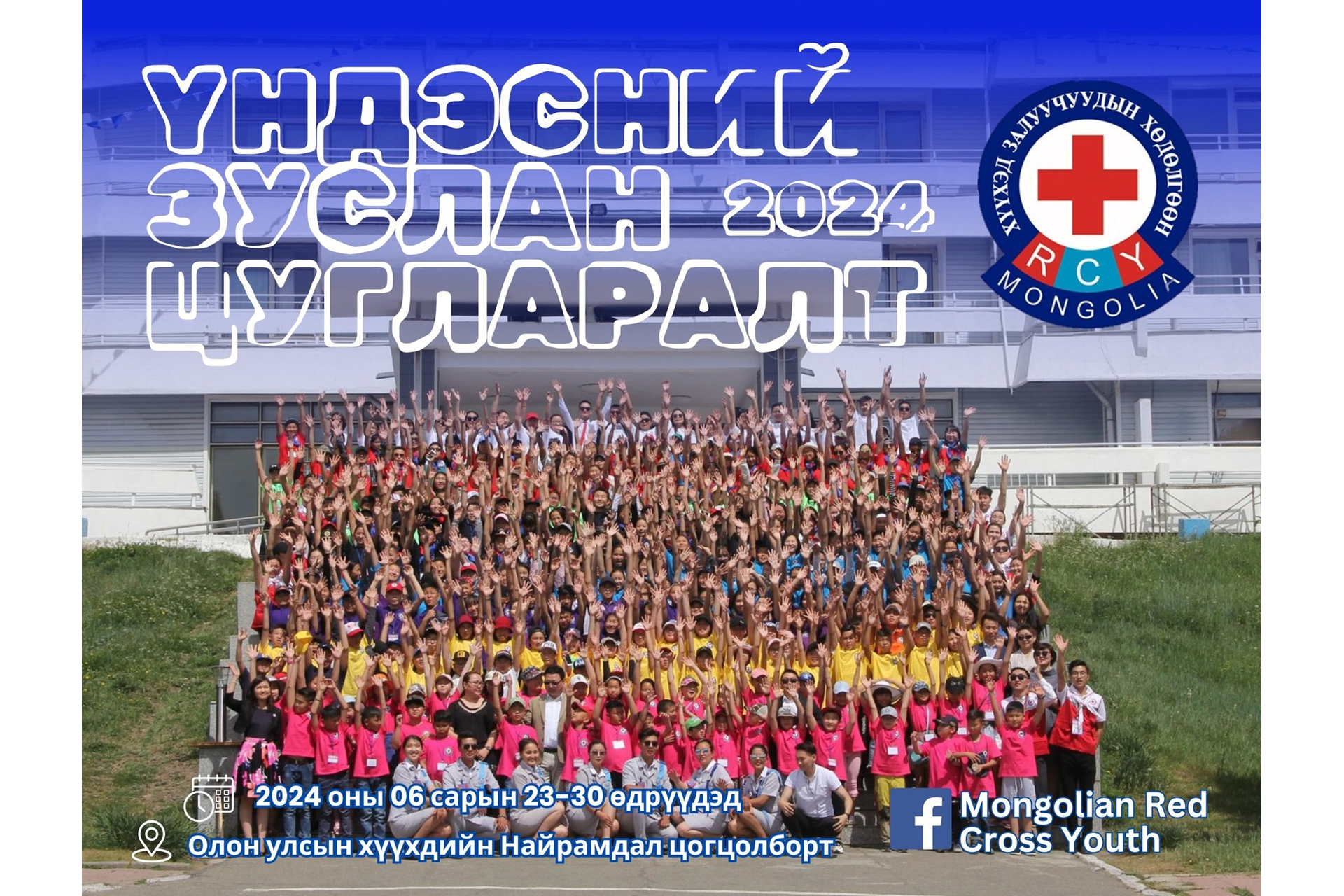
Нийтэлсэн өдөр: 2021.11.23, мягмар
.jpg)
Job Title: Coordinator, Disaster Law Programme
Organizational Unit / Duty Station:Disaster and Crisis Unit, Asia Pacific Regional Office/ Outposted to Ulan Bator
Line Manager / Immediate Supervisor:Head, Disaster and Crisis Unit, Asia Pacific Regional Office
Second Line Manager:Deputy Regional Director, Asia Pacific Regional Office
Technical Manager:Global Lead, Disaster Law and Legislative Advocacy, Geneva
Duration: Full-time for 1 year (with possibility of extension)
Interested candidates shall send their Cover Letter and CVs (English) with a recent photo to the following email account: hr.eastasia@ifrc.org no later than 17:00 December 7, 2021. Only short-listed candidates will be invited for an interview. Please mark clearly of the position name you applied (Coordinator, Disaster Law Programme) in the subject of the email.
Organisational context
The International Federation of Red Cross and Red Crescent Societies (IFRC or “the Federation”) is the world’s largest volunteer-based humanitarian network. The Federation is a membership organization established by and comprised of its member National Red Cross and Red Crescent Societies. Along with National Societies and the International Committee of the Red Cross (ICRC), IFRC is part of the International Red Cross and Red Crescent Movement.
The overall aim of the IFRC is “to inspire, encourage, facilitate, and promote at all times all forms of humanitarian activities by National Societies with a view to preventing and alleviating human suffering and thereby contributing to the maintenance and promotion of human dignity and peace in the world.” It works to meet the needs and improve the lives of vulnerable people before, during and after disasters, health emergencies and other crises. The IFRC is served by a Secretariat based in Geneva, with regional, country cluster teams and country offices throughout the world. The Secretariat is led by the IFRC Secretary General and provides the central capacity to serve, connect, and represent National Societies. The Secretariat’s focus includes providing support to the IFRC governance mechanisms; setting norms and standards; providing guidance; ensuring consistency, coordination, and accountability for performance; knowledge sharing; promoting collaboration within and respect for the Movement; and expanding engagement with partners.
As one of the five decentralized parts of the Secretariat, the Asia Pacific Regional Office (APRO) leads the support to National Societies of 38 countries through Country Delegations (CD) and Country Cluster Support Delegations (CCSD) spread across East Asia, South Asia, Southeast Asia and the Pacific. APRO,
One of the programmes overseen by the Disaster and Crisis unit is the Disaster Law). IFRC Disaster Law delivers against key regional results outlined in Strategy 2030, namely Outcome 2.4: National Societies expand their leadership in the field of disaster law. with links to other strategic areas and enabling areas for action.
Job purpose:
Under supervision of the Head of Disaster and Crisis Unit, the Disaster Law (DL) Coordinator guides the IFRC network – and by extension governments – in Asia Pacific in developing and applying climate-smart disaster-related legislation, regulations, frameworks, policies and procedures. The Coordinator oversees a region-wide team which delivers results in recognized disaster areas including supporting enhancing or complementing legislative advocacy capacities of National Societies, contributing to strengthening National Society auxiliary role, and supporting enhancing of National Society legal bases. Overall, IFRC Disaster Law work aims to make communities safer and to improve the protection of vulnerable people at risk of disasters, climate change and crises.
Job duties and responsibilities
Technical:
1. Provide high quality technical assistance on strengthening climate smarts disaster law to Asia Pacific National Societies and their authorities, through the initiation and timely implementation of high-quality country-level technical support projects, and by providing advice on the drafting of legal instruments.
2. Undertake capacity building of National Societies and governments representatives on legal issues in relation to the climate emergency, disaster risk management and pubic health emergencies through the conduct of trainings and workshops on all aspects of disaster law and legislative advocacy.
3. Develop and implement regional advocacy and dissemination strategies on disaster law and support wider legislative advocacy initiatives as required by IFRC. Activities include organizing regional consultations to develop or validate IFRC Disaster Law recommendations, guidance and tools, the dissemination and information-sharing activities, delivering presentations at meetings and conferences.
4. Provide support on behalf of the region to Disaster Law activities, including but not limited to:
a. regional preparations on disaster law aspects of the 34rd International Conference of the Red Cross and Red Crescent, and other relevant climate and disaster related events such as the UN Climate Change Conference, Global Platform for Disaster Risk Reduction, and other upcoming events,
b. support regional representation and thematic consultations on new recommendations developed by IFRC Disaster Law,
c. support development and ensure the quality of new comparative research on legal issues in climate change, disaster management and public health emergencies Asia Pacific , including with regard to protection, gender and inclusion in disaster law, integration of climate change adaptation into DRM law and policy, RCRC auxiliary role in sectoral laws, public health emergency, and other subjects as requested,
d. cooperation in the development of communications tools, such as the programme’s newsletters, case studies, reports and videos, and events,
Management:
5. Responsible and accountable for the overall day-to day management and coordination of disaster law activities in Asia Pacific.
6. Select, mentor and manage Asia Pacific Disaster Law team members, including ensuring that they have well-defined results-based priority plans and capacity to provide technical support to response operations at any time.
7. Promote a culture of continuous learning, individual and team accountability in the programme by setting individual and team objectives, monitoring team performance and conducting timely performance reviews.
8. Ensure that the Asia Pacific disaster law team prepares accurate and timely monthly operational highlights, quarterly updates on operations and annual updates on operations as well as deliver inputs for standard reports.
9. Ensure that the Asia Pacific disaster law team works closely with all thematic leads in the Disaster and Crisis Unit and coordinates with other units within APRO, COs, CCSDs, Geneva and DLP colleagues in other regions, as well as with ICRC, Partner National Societies, relevant IFRC Reference Centres and key external stakeholders throughout the programming cycle.
10. Develop annual plans for the Asia Pacific disaster law programme in coordination with the Head of Disaster and Crisis Unit, Manager, the DLP Lead in Geneva and relevant partners, as well as mobilize, manage and monitor the use of available financial resources and facilities by the team to ensure that delivery of agreed activities is in line with approved ceilings and finance procedures.
11. Identify risks and challenges to the ongoing programmes, raise with regional, country-level and Geneva counterparts, and provide advice as relevant to APRO Senior Management Team (SMT) on mitigation strategies.
Strategic direction, programmatic coherence, quality and accountability:
12. Provide strategic and technical advice to APRO technical units, Country Offices, CCSD and National Societies and collaborate with Geneva, DLP colleagues in other regions, and other teams in the AP region on issues on disaster law, legislative advocacy and auxiliary role work.
13. Ensure the integration of cross-cutting issues, such as PGI, climate action, health, migration and displacement, community engagement and accountability (CEA) and IFRC-wide access, into disaster law and legislative advocacy programming.
14. Provide strategic direction to thematic leaders, and where necessary technical guidance, in operationalizing approaches that will systematically strengthen National Society on disaster law and legislative advocacy preparedness and response capacities and enable them to fulfil their auxiliary roles.
15. Promote and engage in systematic monitoring and evaluation of disaster law and legislative advocacy programmes and the identification and synthesis of best practices and lessons learned for organizational sharing and learning.
16. Provide strategic direction to thematic leaders, Country Offices, CCSD in the areas of disaster law, legislative advocacy and auxiliary role, including supporting engagement and positioning with relevant local, national and regional actors.
17. Actively participate in and support IFRC’s knowledge and peer-to-peer networks, promote the engagement and utilization of Red Cross Red Crescent reference centres, provide guidance on operationalizing labs and hubs, and contribute to “shared leadership” initiatives for better utilization and optimization of technical capacities and resources.
Coordination and Representation
18. Build and nurture solid relationships with key partners – including donors, governments, multilateral partners, UN (in particular UNESCAP and UNDRR), Civil Society academia and the private sector – in promotion of key disaster law and legislative advocacy initiatives.
19. Ensure technical-level engagement with relevant entities of sub-regional multilateral mechanisms such as the Association of Southeast Asian Nations (ASEAN), Pacific Islands Forum (PIF) and South Asian Association for Regional Cooperation (SAARC) as essential stakeholders in attainment of the 2030 Global Agenda.
20. Mobilize resources for disaster law work in the region. Maintain strong partnerships with key programmatic partners, in particular the Australian Red Cross and the German Red Cross. Submit funding proposals and report on the implementation of the program, as required.
At requested, represent IFRC – in regional inter-agency events relevant to disaster law and wider legislative advocacy efforts – as a key actor, influencing regional policies, advocacy and agenda.
Position Requirements
Education
• Master’s degree or equivalent in comparative and/or international law is required.
• Bachelor’s degree or equivalent in law is required.
• Basic Delegates Training Course (BTC), WORC, IMPACT or equivalent knowledge is preferred.
Experience
• At least ten years of legal advocacy experience, including at least 5 years at the international level (or in a country other than the home country)
• Experience with technical assistance in the development of legislation
• Experience in diplomatic and inter-governmental advocacy
• Experience of managing teams and budget
• Experience in narrative and financial reporting and proposal writing
• Experience in legal/academic writing
• Experience in coordinating with the authorities and other humanitarian/development actors
• Experience working in the Red Cross Red Crescent Movement
• Experience in the Asia Pacific region
Knowledge and Skills
• Thorough knowledge of international and domestic legal and policy framework related to climate smart disaster laws
• Self-supporting in computers (Email, Internet, spread sheets, word-processing, etc.)
• High degree of discretion, tact and sensitivity in dealing with stakeholders at all levels
• Communication and negotiation skills
• Outstanding networking and representation skills
• Proven good judgment and ability to work with complete integrity and confidentiality
• Results oriented and demand-driven individual
• Demonstrated leadership and management skills
• Ability to lead within a matrix management structure
• Ability to lead multi-cultural, multi-lingual and multi-disciplinary teams
Languages
• Fluent spoken and written English is required
• Good command of another IFRC official language (French, Spanish or Arabic) is preferred

